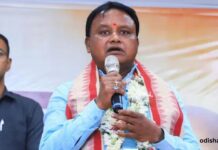Dr Dipak Samantrai

Lord Wavell, Viceroy of India, was paying hurricane visits to Odisha School of Engineering which subsequently became Bhubanananda Odisha School of Engineering to during the World War II time to supervise war efforts. This institute trained more than 1000 “War Technicians” and was at the centre of war efforts in the eastern zone.
Popularly known as BOSE, it was created by the then Government of Bihar and Odisha. When Bihar School of Engineering was elevated to the status of a college, Odisha School of Engineering came up as the sole technical institute of the region. Prior to this, students of Odisha used to travel to Bihar for technical education.

Located on the southern side of River Mahanadi, near Jobra barrage, it was spread over an area of 44 acres. The sprawling campus had the main institution, laboratories, library, separate hostels for boys and girls and staff quarters. It shared space with Biju Patnaik Film and Television Institute of Orissa. It also had a lush green playground, maintained by a local club, Union Sporting Club. The playground was a witness to many important sports events and matches.
Now BOSE has been squeezed to 11acres of land. The rest of the land is being used for the upgradation of the SCB Medical College and Hospital.” We don’t have a field to practice cricket now which we used to everyday” rues Babali Tripathy, a MBBS student.
Hrushikesh Mohanty, the Principal, assures us that the heritage building of the Institute is not going to be affected in any way. From ninteen hundred and twenty-three to twenty twenty-three, it has been a glorious and eventful one hundred years for Bhubanananda Odisha School of Engineering. A singular achievement which deserves a befitting celebration, definitelyThe plans for it are not yet finalised.The Principal says, “We have written to the government. We shall plan out the celebrations after getting the approval”.
Cut to the Past
Odisha School of Engineering became Bhubanananda Odisha School of Engineering to honour an iconic Engineer Politician and Philanthropist of the State. Bhubanananda was the twin brother of the famous legal luminary, Bichitrananda Das (Swamiji).
After getting his degree from Shivapur Engineering College, he went to England on a scholarship. There Bhubanananda was awarded a degree in Electrical and Mechanical Engineering by Glasgow University. Served London Tramways for a year. After returning to the country, he did a brief stint with Bombay Tramways then, he decided to go on his own. He established many electricity companies including one each at Rajkot Sikharpur and Puri. He was a Consultant to Tata, Birla and many others.
He went to London a number of times to present the views of Odisha so far as the contested claims over borders were concerned before the Joint Parliamentary Committee. For 35 years he represented Odisha in the Viceroy’s Council. His generosity and open-hearted hospitality to everyone from his home state ensured that he didn’t have any savings. But he was respected as the “Father of Parliament” for his decade-long presence there. He was the Chairman of the Public Accounts Committee and known for his forthright views. His views facilitated the establishment of the multipurpose Hirakud Dam and checked wasteful expenditure on it as well.

The genesis of BOSE can be traced to the Cuttack survey school of 1876 vintage. The institute began with two technical courses in Civil Engineering and Electrical-Mechanical Engineering but later on a number of courses were added. Currently it has expanded to include three year diploma courses or polytechnic courses in eight disciplines. The institute also has a Mathematics and Science Department that provides courses for first year students and other advanced courses as well. It has a very impressive library and it is spread across 725sq.m. The students have easy access to books that are otherwise rare and expensive to find in the market. The total number of books there in the library is around 37000 and the number of periodicals and journals are around 30 in number. The reading room is also very impressive. It is spread across an area of 1600sq.ft. The library is one of the oldest and well stocked libraries in the State.
The principal says that “technology for prosperity” is the motto of the institution. The first principal of this institution was P.J Parkinson. He was there till 1928. After him, there has been a long line of succession with each one of the them trying to achieve newer heights for the institution. This institution has a very sound reputation as far as employment potential and actual employment are concerned. It has a very high rate of employment even now and in the earlier period, it did have the distinction of having produced a row of Chief Engineers and Superintending Engineers and they worked employed across various governmental departments of the state.

The alumni of this institution has contributed immensely towards the construction of the Hirakud Dam. As we know, it is a prestigious hydro-electric project, one of the largest in the country. Not only in the field of technology, the institution has also contributed in the field of games and sports and it carries immense value. Team sports like hockey, football, cricket were headed by the Pattnaik brothers (P Pattnaik, Banabasi Pattanik, J.K Pattnaik) at one point of time. Footballer Golak Samal, a jewel of this institution, represented India in 1955 for the Kabul Tour. In cricket, P. Pattnaik represented the state for a decade. Moreover, it has clenched the hockey championship for three years in succession. It’s playground should not have been disturbed but it has been. A wide road has cut through the campus because of the plans for upgrading the Shri Ram Chandra Bhanja Deo Medical College Campus and some of the beauty of the campus has been lost in the process.
There is discernible gloom in the circle of the former members of the faculty of the institution as well as alumni. Everyone is of the opinion that these changes will affect the institution adversely. Physically and aesthetically. But the authorities are insisting that it is not going to change the character of the institution in any substantial manner. So, the only thing we can do right now is to keep our fingers crossed and wait for the future to unfold itself.
(Dr Dipak Samantrai is a former public broadcaster, media educator and history enthusiast living in millennium city of Cuttack.)

























